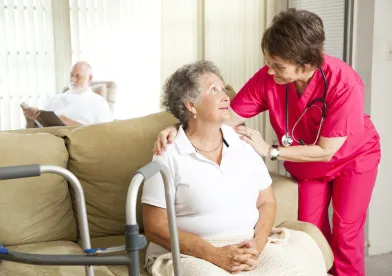For many families, the COVID-19 pandemic will present ethical and moral dilemmas relative to the health, safety and well-being of our elderly parents and grandparents, made more vulnerable because of chronic medical conditions and weakened immune systems. The COVID-19 mortality rate for this population is the highest in the country – and the world. Indeed, New York has enacted “Matilda’s Law,” named after Governor Cuomo’s mother, to restrict and protect individuals age 70 and older, those with compromised immune systems and those with underlying illnesses.
Yet, the social distancing and imposition of quarantines, in many places mandated by law, present other risks and consequences for the emotional well-being of our elderly family members who thrive and depend upon familial interaction and support. This raises moral, ethical and emotional dilemmas for the family and for the health care providers for these individuals.
One Family’s Decision
This situation presented earlier this week within co-author Ross Ellick’s own family. His parents, 87 and 84 years old, “snow birds” due to return to Philadelphia from Miami on March 31, became concerned as Miami was shutting down with COVID-19 cases rapidly increasing in Broward County. The couple, isolated and separated from their children and grandchildren, expressed a strong desire to travel home to Philadelphia immediately.
There didn’t appear to be a clear right or wrong decision. Isolation in Miami, likely for an extended period of time, versus isolation at their home in Philadelphia, closer and accessible to their loved ones and their own doctors. The family was naturally concerned about the negative consequences a lack of social and family support, particularly in times like this, could have on their emotional and physical health. Suffice it to say, their children and grandchildren shared very different opinions about whether it was safer for the couple to “shelter in place” or travel through two busy international airports to get home. In the end, the couple decided to take their chances, and perhaps even risk their lives, and came home.
Hard Choices
As further discussed in another context below, there will be many tough decisions to be made around the care, love and protection that we are able to provide to our elderly family members, so at risk in this pandemic. The choice is a double-edged sword – risk contracting the virus or risk isolation and distancing, which seems prudent but also can cause harm. These are tough times that present a difficult balancing act.
Nursing home and home health care aides face these dilemmas as well. They must balance the needs of the residents they service with the anxieties of families who want to visit them or want them to come home now more than ever. Of course, they also must deal with their personal and family needs and anxieties as they work with the at-risk population.
The CMS prohibition on visitors in nursing homes coupled with “shelter in place” orders deny children and grandchildren access to their loved ones, the most vulnerable, at perhaps the most critical time in their lives. Elderly parents residing at home or in long-term care facilities are frightened as are their children. They see staff wearing protective gear, fellow residents in isolation or quarantine, and media reports of people dying at an increased rate in similar facilities.
Consider the ethical and moral dilemma faced by an operator of a resident health care center when the children want to take their parents out of the facility for fear of them contracting the virus. The question then becomes what is best for the resident. On one hand, there is an arguably reduced risk of contracting the virus at home. On the other, can the families effectively meet the elderly parents’ needs at a home not otherwise equipped with the tools to assist with their activities of daily living? Perhaps there is an increased risk of falls if they are in a new environment. Will there be overnight care? Are there enough people to assist moving the resident safely from a bed to a chair? Do they need a mechanical lift? How can they be safely bathed or changed?
Conflicting Priorities
What is the obligation of the operators of the facilities under these circumstances? They need to consider whether sending the resident home increases the risk of illness or injury and balance that against the decreased strain on the facility’s resources. If they determine that the family cannot meet the residents’ needs or if the family members are not screened safe for the transmission or exposure to the coronavirus, can the facility refuse to let them go? The families then may consider signing them out or taking them home against medical advice.
These questions must be considered on a case-by-case basis, but how can they be answered when there really is no context for standard of care or practice under the current circumstances? We only can answer honestly that there are so many unknowns that operators have to act in good faith after an examination of all information available from official and reliable sources, and seek input from medical professionals. All efforts to reach a reasonable decision should be documented. We all seemingly are desperate to save ourselves, our loved ones and those we serve, and to flatten the curve. Hindsight may prove some decisions incorrect but all we can do is recognize the gravity of the decisions we make and make the best ones we can.



 />i
/>i

